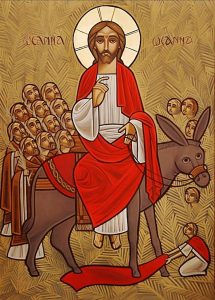 As a preparation for Holy Week and Pascha, the Gospel of the passion of our Lord according to St. Mark is read. Today Jesus enters Jerusalem as the people exclaim, “Hosanna! Blessed is he who comes in the name of the Lord! Which we sing at every Liturgy in the Anaphora. These acclamations proved to be hollow, when the priests and elders seduced the mob to ask for Jesus’ crucifixion.
As a preparation for Holy Week and Pascha, the Gospel of the passion of our Lord according to St. Mark is read. Today Jesus enters Jerusalem as the people exclaim, “Hosanna! Blessed is he who comes in the name of the Lord! Which we sing at every Liturgy in the Anaphora. These acclamations proved to be hollow, when the priests and elders seduced the mob to ask for Jesus’ crucifixion.
Here is a meditation of St. Gregory on the Passion:
So let us take our part in the Passover prescribed by the law, not in a literal way, but according to the teaching of the Gospel; not in an imperfect way, but perfectly; not only for a time, but eternally. Let us regard as our home the heavenly Jerusalem, not the earthly one; the city glorified by angels, not the one laid waste by armies. We are not required to sacrifice young bulls or rams, beasts with horns and hoofs that are more dead than alive and devoid of feeling; but instead, let us join the choirs of angels in offering God upon his heavenly altar a sacrifice of praise. We must now pass through the first veil and approach the second, turning our eyes toward the Holy of Holies. I will say more: we must sacrifice ourselves to God, each day and in everything we do, accepting all that happens to us for the sake of the Word, imitating his passion by our sufferings, and honoring his blood by shedding our own. We must be ready to be crucified. (St. Gregory the Theologian, Homily, 45)
Meditation by Archpriest David Petras
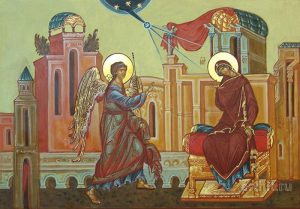 This weekend we are celebrating the mystery of our Lord’s accepting human nature for our salvation. The Archangel Gabriel asks Mary to receive God’s plan and become the mother of the Son and Word of God, to be named “Jesus,” “Savior.” Mary replies, “Behold, I am the handmaid of the Lord. May it be done to me according to your word. (Luke 1:38)” Mary’s response to God was perfect and reversed the sin of Eve. In our Lenten journey, we
This weekend we are celebrating the mystery of our Lord’s accepting human nature for our salvation. The Archangel Gabriel asks Mary to receive God’s plan and become the mother of the Son and Word of God, to be named “Jesus,” “Savior.” Mary replies, “Behold, I am the handmaid of the Lord. May it be done to me according to your word. (Luke 1:38)” Mary’s response to God was perfect and reversed the sin of Eve. In our Lenten journey, we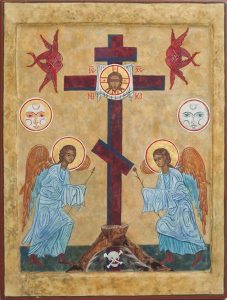 The first half of the Great Fast tells us the stories of Adam and Eve and their children, and the flood of Noah. It is a story of the creation of a perfect world and how that has been marred by human sin. It tells of the end of paradise, “The Lord God therefore banished him from the garden of Eden, to till the ground from which he had been taken. He expelled the man, stationing the cherubim and the fiery revolving sword east of the garden of E
The first half of the Great Fast tells us the stories of Adam and Eve and their children, and the flood of Noah. It is a story of the creation of a perfect world and how that has been marred by human sin. It tells of the end of paradise, “The Lord God therefore banished him from the garden of Eden, to till the ground from which he had been taken. He expelled the man, stationing the cherubim and the fiery revolving sword east of the garden of E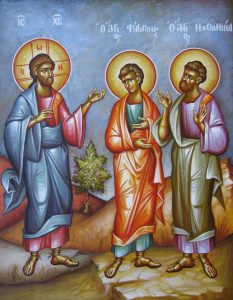 This Sunday is called the “Sunday of Orthodoxy” because it commemorates the restoration of the Church’s teaching on making images (icons) of our Lord and the saints in the year 843. Before that, it was the Sunday of the Commemoration of the Holy Prophets. This explains the Gospel, Phillip witnesses to Nathanael: “We have found him of whom Moses in the law and also the prophets, wrote – Jesus of Nazareth, the son of Joseph.” This is our goal in the Great Fast – to find our faith in Jesus. The Great Fast was the training period for those about to be baptized, and it was a time for the whole community to rediscover its faith. Along the journey to Holy Week, we read especially from the book of Genesis and from Isaiah to guide us to Christ, who will perfect his covenant with us by his death and resurrection. This is why, in the Apostolic reading, we remember Moses, Gideon, Barak, Samson, Jephthah, David and Samuel and all the prophets. It was all for Jesus, “Yet all these, though approved because of their faith, did not receive what had been promised. God had foreseen something better for us, so that without us they should not be made perfect. (Hebrews 11:39)”
This Sunday is called the “Sunday of Orthodoxy” because it commemorates the restoration of the Church’s teaching on making images (icons) of our Lord and the saints in the year 843. Before that, it was the Sunday of the Commemoration of the Holy Prophets. This explains the Gospel, Phillip witnesses to Nathanael: “We have found him of whom Moses in the law and also the prophets, wrote – Jesus of Nazareth, the son of Joseph.” This is our goal in the Great Fast – to find our faith in Jesus. The Great Fast was the training period for those about to be baptized, and it was a time for the whole community to rediscover its faith. Along the journey to Holy Week, we read especially from the book of Genesis and from Isaiah to guide us to Christ, who will perfect his covenant with us by his death and resurrection. This is why, in the Apostolic reading, we remember Moses, Gideon, Barak, Samson, Jephthah, David and Samuel and all the prophets. It was all for Jesus, “Yet all these, though approved because of their faith, did not receive what had been promised. God had foreseen something better for us, so that without us they should not be made perfect. (Hebrews 11:39)”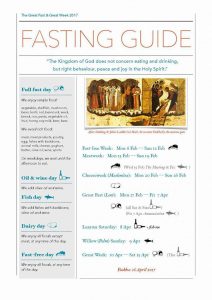
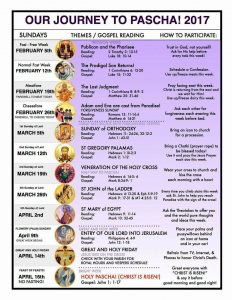
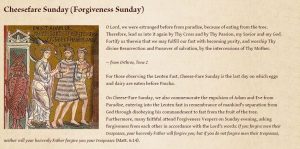
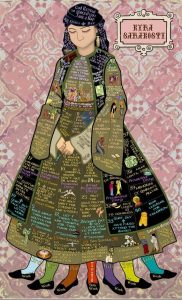 Today, the Church calls this Sunday “Forgiveness Sunday” and you may also know it as Cheesefare Sunday. The Byzantine Church uses the image of Lady Lent to illustrate (especially to children) the meaning of Lent in an accessible way.
Today, the Church calls this Sunday “Forgiveness Sunday” and you may also know it as Cheesefare Sunday. The Byzantine Church uses the image of Lady Lent to illustrate (especially to children) the meaning of Lent in an accessible way.